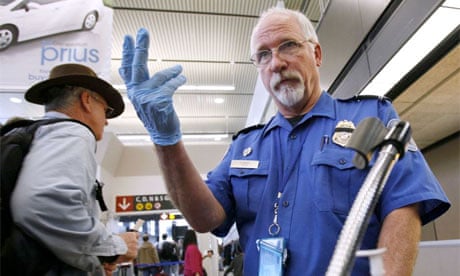Tennessee Congressman Marsha Blackburn doubtlessly meant well when her office released a report titled "Not on My Watch: 50 Failures of TSA's Transportation Security Officers (pdf)", but she missed the point more completely than a professional knife-thrower's target assistant.
It's almost three years now since the Transportation Security Administration first started pretending that "state-mandated sexual molestation" and "national security" are somehow synonymous. Since October 2010, anyone wishing to fly in America – where, I remind you, we like to call ourselves "the land of the free" and work up a patriotic snit-fit should anyone dare suggest any irony there – must adopt submissive surrender-criminal poses while TSA employees either bombard your body with radiation that lets them to see what you look like naked, or give you a sexually explicit groping they euphemistically call an "enhanced patdown". (And you'll get in trouble if you don't pretend to like it: two years ago, the TSA admitted that people who express "contempt against airport passenger procedures" are deemed "high-risk" and punished with extra-thorough security screenings.)
They're not only in airports, either: TSA agents now infest train stations, subways, bus terminals, and even highways, making it harder and harder for ordinary Americans to travel within our own country without encountering either creepy agents who seem to enjoy squeezing unwilling people's genitalia or stupid agents who sincerely think they're helping the country when they do so.
Which brings me back to Blackburn's report, with its profiles of 50 particularly egregious TSA hiring choices: agents accused of crimes divided by category, including "theft", "sex crimes (rape, molestation, prostitution)", "child pornography", "murder" and more.
Blackburn seems to thinks the TSA's main problem is having the wrong people on staff. Wrong. The problem is not that "some of the government agents authorized to shove their hands down your pants might be getting a sexual thrill out of it"; the problem is that "government agents are authorized to shove their hands down your pants."
Even the fact that the TSA appears to have on occasion hired actual thieves to paw through the contents of travelers' luggage is less troubling than the agency's insistence it has authority to paw through the contents of every traveler's luggage.
Back in the 1960s and early 70s, airline hijackings were almost monthly events, and the US also faced the major existential threat of a belligerent superpower with tens of thousands of nuclear warheads aimed at us. We got over those crises without gutting our constitutional freedoms. So, why must we abandon them now over a handful of religious fanatics and pissed-off college students?
Blackburn's report does pose that question:
"One hundred and thirty-four domestic flights were hijacked in the United States between 1961 and 1972. In response to these hijackings, the Federal Aviation Administration (FAA) implemented domestic passenger security screening at airports across the United States in 1973. This required airlines to conduct pre-board screening of passengers and their carry-on items. The following year, Congress passed the Air Transportation Security Act of 1974 …
"As a result of these new screening procedures, incidents of domestic hijackings were virtually nonexistent in the United States by the 1990s. However, the horrific events on the morning of 11 September 2001 completely changed the way our government must view federal aviation security."
She's right – but only up to a point. The al-Qaida terrorist attack 12 years ago proved the need for two major changes to American airline security standards: strengthen cockpit doors so would-be hijackers can't force their way in; and let passengers know that the old conventional wisdom – "in a hijacking, the safest thing to do is co-operate with the hijackers" – is incorrect. The 9/11 attacks succeeded only because terrorists exploited a loophole, which closed before that horrible day even ended when the fourth hijacked plane crashed into a Pennsylvania field rather than a Washington landmark – because passengers realized they needed to fight back.
So, we secured the cockpits and warned passengers not to co-operate with terrorists. And then we also passed the Patriot Act, gave the NSA free reign to monitor our communications, and let the TSA convince us that only wild-eyed, selfish, anti-American radicals believe "I don't want strangers groping me when I travel."
Meanwhile, the president and Congress mostly ignore their oaths to protect American constitutional freedoms. And even the ones who try to do so get distracted by releasing earnest, well-meaning reports explaining why the main problem with America's mandatory molestation policy is just that we're being molested by the wrong kind of people.
